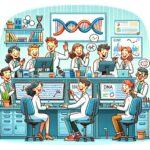
Top 10 Must-Take Bioinformatics Courses for 2024 That Are Absolutely Free!
September 17, 2023Unlock the Secrets of Life: Top 10 Must-Take Bioinformatics Courses for 2024 That Are Absolutely Free!
Introduction
Ever wanted to crack the code of life? The field of bioinformatics is where biology shakes hands with big data, and guess what? You can become a part of this revolutionary science without leaving your couch! Whether you’re a complete newbie or an industry veteran looking to brush up on your skills, there’s a course tailored for you. The best part? Many of them are absolutely free! Here’s your ultimate guide to the top 10 most groundbreaking bioinformatics courses that you should absolutely enroll in this year.
1. Bioinformatics Essentials: A Course by UC San Diego
Immerse yourself in the foundational elements of bioinformatics with this free Coursera course. From sequence alignment to gene expression analysis and phylogenetics, this course is your gateway into the fascinating world of bioinformatics.
2. Bioinformatics Specialization: The Full Package (Coursera)
Craving more depth? This Coursera series packs a punch with its extensive coverage of bioinformatics topics, from algorithms to sequencing and even genomics.
3. The Bioinformatics Starter Pack: An Introductory Course
Also offered on Coursera, this free course lays down the essential building blocks you’ll need, such as sequence alignment, gene expression analysis, and phylogenetics.
4. The Bioinformatics Treasure Trove: 100+ Courses in 2024
Looking for options? You’ve got over 100 of them! This resource brings together free courses from some of the world’s most esteemed universities like Harvard, Stanford, and MIT.
5. Cream of the Crop: Top Bioinformatics Courses Online
Can’t decide? Check out this curated list of the best free online courses in bioinformatics. It’s like a hall of fame but for bioinformatics courses!
6. The Udemy Bioinformatics Suite
Not to be outdone, Udemy offers a range of courses covering everything from bioinformatics basics to some of the most advanced techniques in the field.
Additional Honorable Mentions:
- Bioinformatics: University of California San Diego
- Biology Meets Programming: Bioinformatics for Beginners: University of California San Diego
- Genomic Data Science: Johns Hopkins University
- Bioinformatics: Introduction and Methods 生物信息学: 导论与方法: Peking University
- Fundamental Skills in Bioinformatics: King Abdullah University of Science and Technology
- Whole genome sequencing of bacterial genomes – tools and applications: Technical University of Denmark (DTU)
- Introduction to Genomic Technologies: Johns Hopkins University
- Bioinformatic Methods I: University of Toronto
- Bacterial Bioinformatics: University of Virginia
- Python for Genomic Data Science: Johns Hopkins University
Bonus Section: The Class Central Bioinformatics Goldmine
If you’re still not sure where to start, or if you’re looking for something incredibly specific, Class Central has got you covered. It’s a treasure trove of specialized bioinformatics courses tailored for everyone from biologists and computer scientists to healthcare professionals and data scientists. Take a look at these specialized offerings:
Specialized Fields in Bioinformatics:
- Bioinformatics and Computational Biology
- Introduction to Bioinformatics
- Bioinformatics for Beginners
- Bioinformatics for Biologists
- Bioinformatics for Computer Scientists
- Bioinformatics for Health Professionals
Application-Specific Bioinformatics:
- Bioinformatics for Drug Discovery
- Bioinformatics for Agriculture
- Bioinformatics for Environmental Science
Advanced Bioinformatics Topics:
- Bioinformatics for RNA Sequencing
- Bioinformatics for DNA Sequencing
- Bioinformatics for Protein Sequencing
- Bioinformatics for Genomics
Cutting-Edge Research Focus:
- Bioinformatics for Deep Learning Research
- Bioinformatics for Forensic Science Research
- Bioinformatics for Personalized Medicine Research
…And Many More!
For a complete list and to find the course that fits your needs, check out the Class Central bioinformatics section.
Extra Bonus: Don’t Miss These Additional Platforms for Bioinformatics Learning!
If Class Central’s vast library wasn’t enough, other reputable platforms like Coursera, edX, and Udemy also offer a plethora of courses on bioinformatics. These platforms provide courses designed by universities and professionals worldwide, ensuring top-tier education in this emerging field.
Coursera’s Exclusive Bioinformatics Courses:
- Bioinformatics for Health Professionals
- Bioinformatics for Biologists
- Bioinformatics for Computer Scientists
- Bioinformatics for Drug Discovery
Hot Picks from edX:
Udemy’s Bestsellers:
And More on Coursera:
- Bioinformatics for Agriculture Research
- Bioinformatics for Environmental Research
- Bioinformatics for Forensic Science Research
…And this is just the tip of the iceberg! Explore Coursera, edX, and Udemy for even more specialized bioinformatics courses to match your exact learning goals.
What are the best free bioinformatics courses?
For anyone interested in pursuing a career in bioinformatics, some of the best free courses they can access are Introduction to Bioinformatics, Whole Genome Sequencing of Bacteria, Bioinformatics Algorithms Part 1, Metagenomics: Analysis of Genetic Material from Environmental Samples and Data-Driven Models for Precision Medicine. These courses offer a great introductory to advanced understanding, providing learners with the fundamentals in bioinformatics.
What are the best bioinformatics courses for beginners?
For those just starting out in bioinformatics, Coursera offers several great courses to get you started. The Bioinformatics Specialization provides an in-depth understanding of the essentials of bioinformatics. For a more targeted approach, Bioinformatics Methods 1 and Bioinformatics Methods 2 focus on the application of bioinformatics tools to analyze genomic data. Plant Bioinformatics Methods is a great resource for those interested in working with plant genomics and DNA Analysis provides an introduction to analyzing DNA sequences.
What are the best advanced bioinformatics courses?
If you’re looking to gain more advanced knowledge in the area of bioinformatics, some of the best courses are Genomic Data Science Specialization, Accessing Bioinformatics Databases with BioPython, Data, Genes, and Medicine, Systems Biology Specialization and Plant Bioinformatics.
What are Bioinformatics, and why is it important to learn?
Bioinformatics illustrate a unique interdisciplinary approach to computing in modern biology. They combine Computer Science, Information Engineering, Mathematics, and Statistics to analyze and interpret biological data. Computer programming methodologies, such as Python, are applied in Bioinformatics for the purpose of managing the structure, function, evolution, mapping, and editing of genomes—or, an organism’s complete set of DNA.
Bioinformatics are critical to understanding normal versus abnormal genomes, and are even said to have sparked a revolution in medical discoveries. That is likely because Bioinformatics enables learners to leverage data and information from genomic datasets, helping to identify the genetic basis for diseases and providing a clearer path to finding treatments.
What jobs can you get in Bioinformatics?
As big data proliferates in all fields, many new job opportunities lie in Data Science and Bioinformatics. Career opportunities start at Bioinformatician and branch out into careers in Bioengineering, Computational Science, Software Engineering, Machine Learning, Mathematics, Statistics, Molecular Biology, Biochemistry, Information Technology, Clinical Research, and other fields that heavily rely on information derived from genomes.
How can online courses help you learn Bioinformatics?
Learners interested in Bioinformatics will find hands-on courses that put them at the center of genome-related challenges.
Covering the basics, you’ll investigate DNA replication, the role of DNA patterns, and other ways to garner information from DNA. Methodologies you can explore include multiple sequence alignments, phylogenetics, gene expression data analysis, protein interaction networks, and more.
Learners can also experience real-life Bioinformatics scenarios within scientific settings. You’ll discover algorithms for solving various biological problems, and take on assignments designed to help you implement these algorithms in Python.
Successful learners will be able to address many questions in modern biology that need a computational approach in order to be answered.
What skills or experience do I need to already have before learning about bioinformatics?
A background in biology, math, or programming can be useful in the study of bioinformatics. Coursework in biology, specifically molecular biology, can help you understand some of the terms you will encounter as you learn bioinformatics. You’ll likely find some knowledge of basic calculus and linear algebra as well as descriptive and inferential statistics beneficial for learning and practicing bioinformatics analysis methods. Additionally, experience with database management or using a programming language like Python, R, or Java may also be useful as you explore bioinformatics methods and tools researchers use in their work.
What kind of people are best suited for roles in bioinformatics?
People working in the field of bioinformatics come from diverse backgrounds, but what they have in common is a passion for analyzing data and a desire to understand the role of DNA in medicine. Some start their careers as computer scientists who decide to apply their skills to the study of molecular biology. Others are biologists who want to take a more active role in the analysis of laboratory discoveries. Many of them enter the field because it combines their interest in data science, programming, and biology. They typically thrive in environments where they learn new information and have a chance to apply their discoveries to real-world issues.
How do I know if learning bioinformatics is right for me?
If you’re fascinated by the natural world and enjoy discovering what makes people tick on a molecular level, then learning bioinformatics may be right for you. You’ll be able to take a closer look at topics like DNA and RNA sequencing, protein interaction networks, and epigenetic patterns. Learning bioinformatics can help prepare you for a career shift if you already have a background in computer science or programming and want to apply it to research used to treat diseases like cancer. Bioinformatics is a broad field, so you have an opportunity to develop and enhance your skills that can be used in a variety of settings and roles, from laboratories to data warehouses.
What are the benefits of taking an online Bioinformatics course?
Online Bioinformatics courses offer a convenient and flexible way to enhance your existing knowledge or learn new Bioinformatics skills. With a wide range of Bioinformatics classes, you can conveniently learn at your own pace to advance your Bioinformatics career skills.
Conclusion
With this wide array of top-notch courses available across multiple platforms, the golden age of bioinformatics education is truly upon us. Whether you’re a novice dipping your toes into bioinformatics or a seasoned professional looking to update your skills, these extensive resources have got you covered. Seize the opportunity to embark on your tailored learning journey today and unlock the full potential of bioinformatics!
















